 Petzlover
Petzlover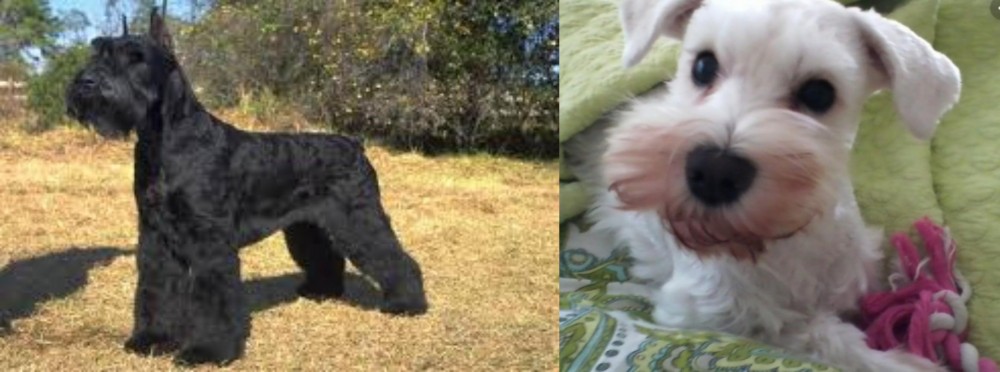 Both Giant Schnauzer and White Schnauzer are originated from Germany. Giant Schnauzer may grow 34 cm / 14 inches higher than White Schnauzer. Giant Schnauzer may weigh 41 kg / 91 pounds more than White Schnauzer. Both Giant Schnauzer and White Schnauzer has almost same life span. Both Giant Schnauzer and White Schnauzer has same litter size. Both Giant Schnauzer and White Schnauzer requires Moderate Maintenance.
Both Giant Schnauzer and White Schnauzer are originated from Germany. Giant Schnauzer may grow 34 cm / 14 inches higher than White Schnauzer. Giant Schnauzer may weigh 41 kg / 91 pounds more than White Schnauzer. Both Giant Schnauzer and White Schnauzer has almost same life span. Both Giant Schnauzer and White Schnauzer has same litter size. Both Giant Schnauzer and White Schnauzer requires Moderate Maintenance.
 As a working dog breed, the Giant Schnauzer, known also as the Riesenschnauzer, hails from Germany.
As a working dog breed, the Giant Schnauzer, known also as the Riesenschnauzer, hails from Germany.
It is believed that the first Giant Schnauzers emerged in Bavaria in the 17th century already. It is the largest of the 3 Schnauzer dogs – Miniature, Standard and Giant. There are quite a few breeds which have been used in its development – Bouvier des Flandres, Great Dane and the German Pinscher among other.
The dog was bred to work on farms and also used as a military dog during the World Wars.
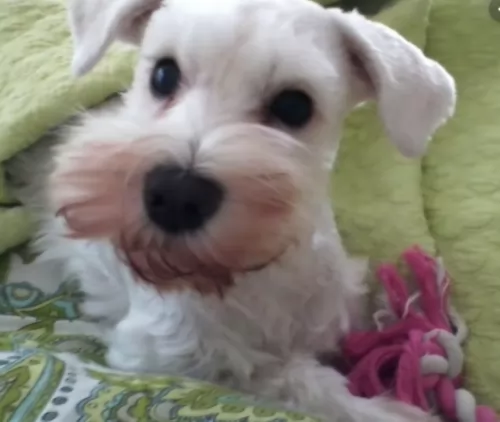 The White Schnauzer was established in Germany in 2006 for people looking for this particular breed of dog but in white.
The White Schnauzer was established in Germany in 2006 for people looking for this particular breed of dog but in white.
The traditional color is salt and pepper. It seems that breed societies don’t allow the white breed, saying they don’t conform to the ideal breed standard.
The White Schnauzer is officially recognized in Germany, If you have a White Schnauzer you may not be able to show him with some of the major kennel clubs.
White is one of the four color varieties of the Miniature Schnauzer and it is also recognized by the Fédération Cynologique Internationale.
 With a thick, medium length double coat to protect him from the weather, the Giant Schnauzer’s coat is essentially wiry and hard and in solid black or in a greyish salt and pepper color.
With a thick, medium length double coat to protect him from the weather, the Giant Schnauzer’s coat is essentially wiry and hard and in solid black or in a greyish salt and pepper color.
The dogs have always traditionally had their ears and tails docked at the 2nd or 3rd joint to set them apart in looks, but these days both the ears and tail are left.
The tail is always held high. He has dark eyes. Like all Schnauzers, they have that distinct beard and eyebrows. The dog is large and well built and stands at 60 to 70cm in height and weighs anything between 25 and 48kg.
Intelligent, strong willed and energetic, the Giant Schnauzer is actually a quiet dog who doesn’t respond too well to strangers, being reserved around them.
He has a natural guarding and territorial instinct. When he is trained and socialized he makes a wonderful pet, responding well to a firm, consistent owner.
He loves his human family, and as a stable, reliable kind of dog, whether you’ve got children in the home, pets or elderly people, you can rely on your Giant Schnauzer to be a dependable, gentle pet at all the right times, being playful and energetic at other times.
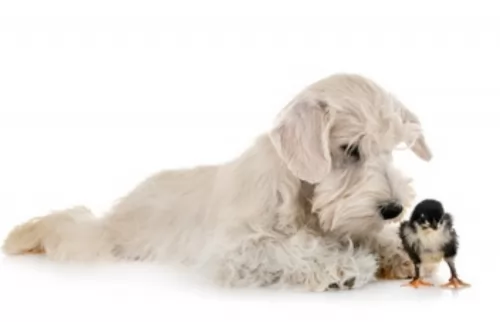 There are a number of different types of White Schnauzer. The white Schnauzer is actually one of 4 color varieties and these dogs are always miniature Schnauzers.
There are a number of different types of White Schnauzer. The white Schnauzer is actually one of 4 color varieties and these dogs are always miniature Schnauzers.
You won’t easily find a Standard- or Giant dog in white. They aren’t albinos, as the skin does have some pigment.
These dogs also have that square-shaped build and they stand between 28 to 36 cm in height and weigh between 4 and 7kg.
The coat is wiry with a soft undercoat. The ears are often cropped to stand erect, but if left they are half-erect, half-floppy and fold forward.
The White Schnauzer is an intelligent dog who will be able to be socialized and trained easily.
He is an energetic little dog and very playful and will get along well with children, loving the games they provide and loving to spend time with all members of his family.
He is loving and affectionate and is willing to share his home and people with other dogs too. He will make you a good watchdog, perhaps encouraged because of his reserve with strangers.
If you provide him with the right amount of mental and physical stimulation, he can become a balanced dog with an amicable personality.
 The Giant Schnauzer has many excellent characteristics which make it such a great pet. He is composed, alert, intelligent, loving and loyal to his human family.
The Giant Schnauzer has many excellent characteristics which make it such a great pet. He is composed, alert, intelligent, loving and loyal to his human family.
He is also playful, being happiest when roped into everything going on in the family. He has a solid, balanced nature, is robust and hypoallergenic.
He is powerful and needs a good dose of exercise and will love to join you on your cycle- and hiking trips. Good with children and pets in the home, this is a dog breed that will make a splendid, reliable pet.
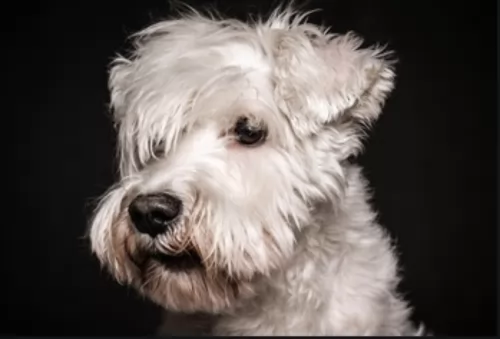 The White Schnauzer is such an adaptable little dog and he will happily adapt to life in the city or in the countryside, just so long as he is close to his human companions and gets sufficient exercise.
The White Schnauzer is such an adaptable little dog and he will happily adapt to life in the city or in the countryside, just so long as he is close to his human companions and gets sufficient exercise.
He is a sociable dog that just loves to be around his human family and won’t like to be separated from them for too long.
He makes a great family dog when you provide him with the right food, a warm dry place to sleep, exercise and lots of love and attention.
 A healthy Schnauzer can reach 10 – 12 years of age, but even so, they are a dog breed prone to high rates of hip- and elbow dysplasia, hereditary eye disease and thyroid disease.
A healthy Schnauzer can reach 10 – 12 years of age, but even so, they are a dog breed prone to high rates of hip- and elbow dysplasia, hereditary eye disease and thyroid disease.
Blood-clotting diseases and epilepsy are also concerns with Giant Schnauzers as well as bloat. As with all deep-chested breeds, Giant Schnauzers are more at risk with this gastrointestinal syndrome known as bloat and which can be life threatening.
It is your right to ask the breeder about the medical history of your puppy’s parents.
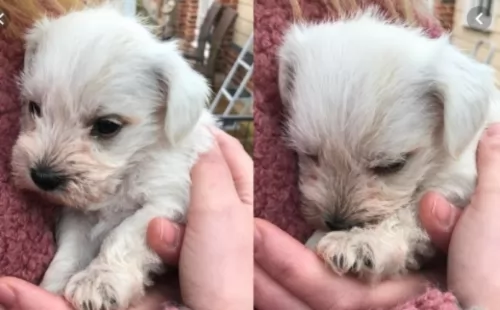 While he is a spunky, robust type of dog, there are always going to be some health concerns to look out for.
While he is a spunky, robust type of dog, there are always going to be some health concerns to look out for.
Kidney stones may well not cause your pet the same pain that humans endure, but they are still a cause for concern. A kidney stone that gets too large and lodges in the ureter becomes a ureterolith. This can be very painful, resulting in pain and even vomiting.
The kidney can even swell and become damaged. Your dog could become critically ill, particularly because of the disrupted flow of urine.
Your pet will possibly have blood in the urine, fever, lethargy, poor appetite and weight loss. Veterinary-intervention will be imperative.
 He is a particularly low shedding dog and so brushing him twice a week will suffice. He loves the closeness with his human family during these grooming sessions.
He is a particularly low shedding dog and so brushing him twice a week will suffice. He loves the closeness with his human family during these grooming sessions.
If you don’t know how to groom yourself, the Giant Schnauzers coat will require hand-stripping or clipping. If you want to keep your dog with that typical Schnauzer look, a visit to a professional groomer will be required as they will also tidy the hair around each paw as well.
Now that the ears are no longer cropped, he has fairly short floppy ears and it will be necessary to ensure that dampness, ear wax and dirt don’t build up to cause ear infections.
The teeth must also be brushed 2 or 3 times a week otherwise plaque buildup can cause dental disease as well as lead to other more serious diseases such as kidney- and heart disease.
If you’re a new dog owner, it can be hard to know which dog food to buy and which ingredients to look out for. Nutrition is of vital importance, and bad ingredients can make your dog sick and shorten his life.
A mix of the best commercially manufactured kibble mixed with home-made food full of the right balance of vitamins and minerals will be important as well as including some raw meat into the diet.
If in any kind of doubt about how to feed a large, energetic dog breed like this Giant Schnauzer, speak to your vet.
As a big, energetic dog, the Giant Schnauzer needs to live on a property where there is a garden. He will be requiring some hectic exercise every day.
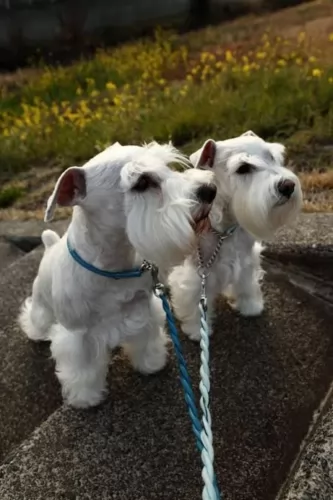 He is a low shedding breed so he will require a brushing just once a week. These dogs also have a certain professional grooming cut. Some schnauzer dog owners do stripping but this is mostly for show dogs.
He is a low shedding breed so he will require a brushing just once a week. These dogs also have a certain professional grooming cut. Some schnauzer dog owners do stripping but this is mostly for show dogs.
Most people just have them sheared to make it easy to groom them. Whether stripped or clipped, they nearly always have a beard and bushy eyebrows.
Trim your pet's nails and give him a general once-over during the grooming sessions to ensure all is well.
You White Schnauzer relies on you to make wise food choices for him. He will eat most things you offer him. That doesn’t mean you should as you can cause him to have a whole lot of digestive problems.
If you choose to give him commercially manufactured dog food, make sure its a high-quality one – devoid of toxic ingredients such as colorants, fillers and preservatives.
If you don’t know how to choose, your vet can show you the foods they have in stock and which would suit your pet best.
A little bit of home-made food now and then can also be good, but the food needs to be plain and simple to avoid abdominal pain. Boiled chicken brown rice and vegetables chopped up and added to the dry kibble occasionally can be a very good choice.